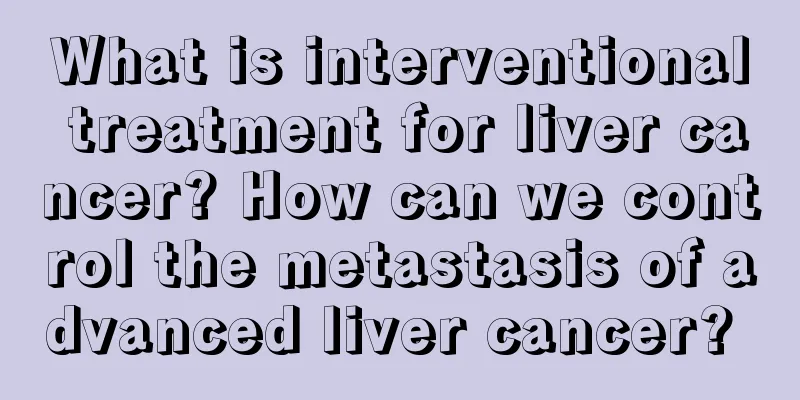What is interventional treatment for liver cancer? How can we control the metastasis of advanced liver cancer?

|
What is interventional treatment for liver cancer? Interventional treatment of liver cancer is a method of diagnosis and treatment that involves inserting a special puncture needle or catheter into the tumor area of the liver under the guidance of X-ray television, CT, or B-ultrasound. With much clinical experience, it has developed rapidly and has become an effective means of treating liver cancer. The following liver cancer patients can all undergo interventional treatment for liver cancer: (1) Primary or metastatic liver cancer that cannot be surgically removed for various reasons, or small liver cancer that the patient does not want to undergo surgery for. (2) As a preparation before surgery, interventional treatment can shrink liver cancer and make it easier to remove. In addition, intervention can reduce the spread and recurrence of the tumor. (3) Patients with incomplete liver cancer resection, postoperative recurrence or failure of other treatment methods. (4) Liver cancer lesions that do not rupture and bleed. (5) No serious damage to liver and kidney function. (6) Patients without severe jaundice and ascites. (7) Patients in good general condition without serious bleeding diseases. Due to the advancement of science and technology, the catheters, guidewires, and puncture needles used for intervention have been greatly improved. In addition, people have more research and knowledge about liver cancer, so there are more treatment methods, such as hepatic artery catheter chemotherapy, thermal chemotherapy, hepatic artery catheter embolization, thermal embolism, percutaneous puncture anhydrous alcohol injection, percutaneous puncture iodized oil plus chemotherapy drug injection, and liver cancer isotope-guided therapy. The effectiveness of interventional therapy is determined by the blood supply characteristics of liver cancer. Under normal circumstances, the liver is supplied by the hepatic artery and portal vein, of which the portal vein accounts for 75% to 80% and the hepatic artery accounts for 20% to 25%. The blood supply of liver cancer is just the opposite. More than 90% to 95% of liver cancer is supplied by the hepatic artery, and the portal vein supplies very little. This makes treatment convenient. Through the hepatic artery catheterization, drugs can directly enter the liver cancer tissue, increase the local drug concentration, and kill cancer cells. In addition, some embolic substances such as iodized oil and gelatin sponge are used to block the blood supply artery of liver cancer, cut off its nutrition, and the tumor tissue will necrotize, thereby achieving the purpose of treatment. Observation and care of patients after interventional surgery is an important link. After surgery, the patient's lower limb on the punctured side should be immobilized for 24 hours, and food should be prohibited for 6 to 12 hours for easy observation; closely observe changes in the patient's breathing, blood pressure, pulse, etc.; whether there is bleeding from the incision; pay attention to the amount and color of urine; postoperative fluid replacement and antibiotics to prevent infection for 3 to 5 days. Due to chemotherapy embolization, patients may experience nausea, vomiting, abdominal pain, fever, etc., which should be treated symptomatically in time, and they will all improve after 1 week. After surgery, patients should review liver function, kidney function, blood routine, etc., and pay attention to changes in various indicators, and actively deal with problems when they are found. What to do if liver cancer metastasizes to the advanced stage Advanced liver cancer may metastasize to the brain. The clinical manifestations of liver cancer brain metastasis include localization symptoms and increased intracranial pressure symptoms. If the tumor is metastatic to the parietal lobe, the main symptoms are sensory impairment, loss of the ability to locate and distinguish sensations, inability to distinguish shapes, sensory ataxia, accompanied by hypotonia, muscle atrophy and tactile inattention. If the dominant parietal lobe is damaged, there may be autosomal agnosia, loss of the ability to distinguish direction and position, inability to calculate, and alexia and agraphia. So, what should we do if advanced liver cancer metastasizes? For patients with advanced liver cancer metastasis, the best way is cell immunotherapy. Biological immunotherapy can be used to treat liver cancer patients, and it can also regulate and enhance the body's immune function, and exert long-term anti-tumor activity in the body. The effect of biological immunotherapy in treating advanced liver cancer can not only eliminate tumor cells in the body, but also prevent tumor recurrence and metastasis. More importantly, biological immunotherapy does not cause any harm to normal human cells or the body's immune system. It is a safe, reliable and side-effect-free tumor treatment method. In addition, biological immunotherapy is combined with internal medicine treatment for patients with stage III liver cancer who cannot undergo surgery and have been embolized, thereby achieving the purpose of prolonging the patient's life. Bio-immunotherapy is the latest tumor treatment technology after surgery, radiotherapy and chemotherapy. It is a treatment method that uses biotechnology to cultivate autologous immune cells that can kill tumors in a high-standard laboratory, and then infuse them into the body to directly kill cancer cells. Different from traditional treatment methods, bio-immunotherapy mainly mobilizes the body's natural anti-cancer ability and restores the balance of the body's internal environment. Bio-immunotherapy can accurately kill residual cancer cells after surgery, improve the effect of radiotherapy and chemotherapy, enhance the patient's immune ability, and better prevent metastasis and recurrence. It has the effect of increasing the efficacy and reducing the toxicity of radiotherapy and chemotherapy, which is conducive to the smooth progress of radiotherapy and chemotherapy. |
<<: What is the best treatment for liver cancer? The most effective methods for treating lung cancer
Recommend
Dietary considerations for glioma patients
The faster humans develop, the more vulnerable th...
My stomach hurts after going to the toilet
Under normal circumstances, people will not feel ...
Introduction to two main diagnostic methods for gastric cancer
After the symptoms of suspected gastric cancer ap...
What are the causes of kidney cancer?
What are the causes of kidney cancer? Kidney canc...
The benefits of drinking whole milk powder
I think everyone should be familiar with milk, ri...
What are the examination methods for lymphoma
Lymph is an important immune organ in the human b...
What are the treatments for gallbladder polyps
In fact, we can treat gallbladder polyps through ...
What department does hemorrhoids belong to
Long-term bowel movement problems, constipation, ...
No starch and sugar weight loss method
When it comes to losing weight, many fat girls ma...
Things to note when measuring blood pressure
For patients with hidden dangers of hypertension,...
Can parvovirus be transmitted to humans?
Friends who have raised dogs should have heard of...
Will excessive calcium supplementation lead to prostate cancer? Revealing the real cause of prostate cancer
In recent years, the incidence of prostate cancer...
What shape is the stool from rectal cancer
Rectal cancer is a serious malignant tumor of the...
Can a stent be used for cerebral infarction?
Cerebral infarction endangers the health of many ...
Is it harmful to drink liquor mixed with Red Bull
Liquor is a drink that many people like to drink....









